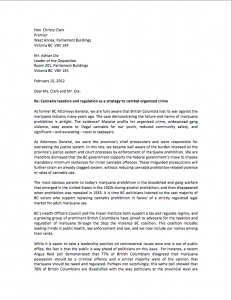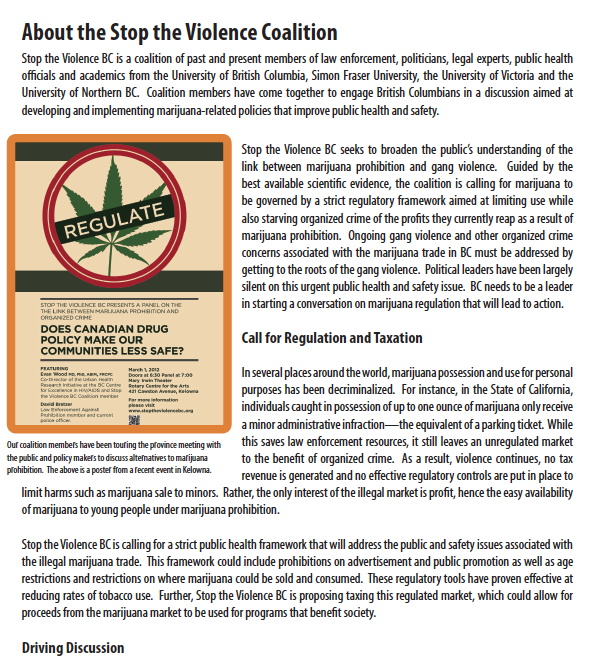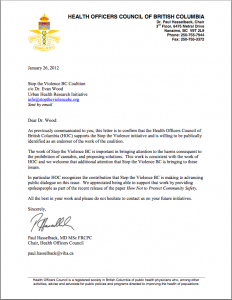World leaders urge Canada to avoid mandatory minimum sentences for marijuana
Virgin Group founder Richard Branson; former Presidents of Brazil, Colombia and Switzerland; and former Federal Supreme Court Justice Louise Arbour call Bill C-10 a ‘grave mistake’
former Federal Supreme Court Justice Louise Arbour call Bill C-10 a ‘grave mistake’
[Vancouver, BC – February 29, 2012]¬¬—World business, legal and political leaders with the influential Global Commission on Drug Policy are calling on Canada to reject the statute for mandatory minimum sentences for minor marijuana offenses proposed in Bill C-10, which is now before the Canadian Senate.
In addition, they are recommending Canadians evaluate possibilities around taxing and regulating marijuana as an alternative strategy to undermine organized crime and improve community health and safety.
In an open letter addressed to Canadian Senators, leaders such as Virgin Group founder Richard Branson and former Brazilian President Fernando Henrique Cardoso assert that the illegality of marijuana, coupled with huge demand for the drug in the U.S., has led to increased organized crime and violence in Canada and Mexico.
Commission members strongly argue that policies that adhere to the failed war on drugs – such as the mandatory minimum sentencing provisions included in the federal government’s Bill C-10 – will not address the issues of gang violence and organized crime. Instead, they favour a public health approach to cannabis policy, including considering a regime of regulation and taxation.
“Tougher drug law enforcement tactics such as mandatory minimum sentencing for minor drug law offences will put a huge strain on Canadian taxpayers,” the letter states. “[They] will not have the intended effect of creating safer communities, and will instead further entrench the marijuana industry in the hands of organized crime groups.”
“With the proposed implementation of mandatory prison sentences for minor cannabis-related offences under Bill C-10, Canada is at the threshold of continuing to repeat the same grave mistakes as other countries.”
The Commission, which includes leaders from countries such as Mexico and Colombia that are hard hit by the war on drugs, called on Canadian lawmakers to adopt an evidence-based approach to controlling cannabis. Commission members referred to the overwhelming evidence that stricter law enforcement policies for minor drug law offenses are destructive, expensive, and ineffective.
“Adopting the mandatory sentencing for minor cannabis offenses would send Canada down a tragic path, likely costing your taxpayers billions and doing nothing to tackle drug violence or drug dependency. Canada should explore policies that treat drugs as a health issue, not a criminal issue, and help lead the way to end the failed war on drugs,” said Mr. Branson.
The Commission further argues that Canada’s national law enforcement policies will have an international impact, with the unintended consequences of a ‘tough on crime’ approach reaching other countries. U.S. law enforcement, for instance, has already described how organized crime groups from British Columbia are active in Washington State.
“The U.S. war on drugs has only deepened the drug problem, with drug prohibition causing violence in countries across the Americas, including Canada,” said Mr. Cardoso, who is also Commission Chair. “Fundamental reforms in national and global drug control policies are urgently needed. We should start by treating cannabis use as a health issue and undermine organized crime by legally regulating the drug’s use rather than promoting prohibition policies which actually fuel gang violence.”
Stricter sentencing fails to reduce crime
The Commission argues that increasing anti-cannabis law enforcement policies like those proposed in Bill C-10 fails to address root causes of organized crime and gang violence, which are natural consequences of drug prohibition. In Canada, such crime and violence are primarily driven by marijuana prohibition.
“The war on drugs, as it has been fought for decades, cannot be won,” said Louise Arbour, former Canadian Supreme Court Justice and current head of the International Crisis Group, which is committed to preventing and resolving conflict. “In countries of production, transit and consumption, it has done much more harm than good. We must implement policies that place community health and safety at the forefront of our efforts, and consider drug use a public health issue rather than a criminal justice issue.”
In their letter, the Commission endorses Stop the Violence BC (STVBC), a coalition of academic, legal, law enforcement and health experts, and its campaign to reform cannabis laws to reduce the harms associated with the illegal cannabis trade, including gang violence. The Commission joins a growing list of recent endorsements including four former mayors of Vancouver, the Health Officers Council of B.C., four former B.C. attorneys general, and a group of high-profile current and former law enforcement officials.
“The Global Commission supports Stop the Violence BC’s suggested approach of regulating marijuana under a public health framework,” said Ilona Szabo, spokesperson for the Secretariat of the Global Commission on Drug Policy. “Mandatory minimum sentences and further reinforcement of prohibition are not rational or prudent solutions.”
For a copy of the Global Commission on Drug Policy letter, please click here.
To join the STVBC conversation, please visit the STVBC Facebook page .
Updates on the campaign are publicly available on Twitter.
To read the coalition’s two major reports, discover more about the coalition and upcoming events, and learn how to support the effort, please visit Stop the Violence BC’s website
For a short video address from President Cardoso on the war on drugs, please click here
-30-
About The Global Commission on Drug Policy
The Commission is the most distinguished group of high-level leaders to ever call for such far-reaching changes on failed drug prohibition policies across the world. Its main recommendations can be summarized as follows:
- End the criminalization, marginalization and stigmatization of people who use drugs but who do no harm to others.
- Encourage experimentation by governments with models of legal regulation of drugs (especially cannabis) to undermine the power of organized crime and safeguard the health and security of their citizens.
- Ensure that a variety of treatment modalities are available – including not just methadone and buprenorphine treatment but also the heroin-assisted treatment programs that have proven successful in many European countries and Canada.
- Apply human rights and harm reduction principles and policies both to people who use drugs as well as those involved in the lower ends of illegal drug markets such as farmers, couriers and petty sellers.
- To learn more about the Commission and read its first report, visit: www.globalcommissionondrugs.org
COMMISSIONERS
Asma Jahangir, human rights activist, former UN Special Rapporteur on Arbitrary, Extrajudicial and Summary Executions, Pakistan
Carlos Fuentes, writer and public intellectual, Mexico
César Gaviria, former President of Colombia
Ernesto Zedillo, former President of Mexico
Fernando Henrique Cardoso, former President of Brazil (chair)
George Papandreou, Prime Minister of Greece
George P. Shultz, former Secretary of State, United States (honorary chair)
Javier Solana, former European Union High Representative for the Common Foreign and Security Policy, Spain
John Whitehead, banker and civil servant, chair of the World Trade Center Memorial Foundation, United States
Kofi Annan, former Secretary General of the United Nations, Ghana
Louise Arbour, former UN High Commissioner for Human Rights, President of the International Crisis Group, Canada
Maria Cattaui, Petroplus Holdings Board member, former Secretary-General of the International Chamber of Commerce, Switzerland
Mario Vargas Llosa, writer and public intellectual, Peru
Marion Caspers-Merk, former State Secretary at the German Federal Ministry of Health
Michel Kazatchkine, executive director of the Global Fund to Fight AIDS, Tuberculosis and Malaria, France
Paul Volcker, former Chairman of the United States Federal Reserve and of the Economic Recovery Board
Richard Branson, entrepreneur, advocate for social causes, founder of the Virgin Group, co-founder of The Elders, United Kingdom
Ruth Dreifuss, former President of Switzerland and Minister of Home Affairs
Thorvald Stoltenberg, former Minister of Foreign Affairs and UN High Commissioner for Refugees, Norway
About Stop the Violence BC
Stop the Violence BC is a coalition of law enforcement officials, legal experts, public health officials and academic experts from the University of British Columbia, Simon Fraser University, University of Victoria and the University of Northern BC. Coalition members have come together to engage all British Columbians in a discussion aimed at developing and implementing marijuana-related policies that improve public health while reducing social harms, including violent crime.
For a full listing of coalition members and to learn more about the coalition, please visit www.stoptheviolencebc.org
For quotes from coalition members, photos and links to downloadable videos of coalition members speaking about the report, please visit www.stoptheviolencebc.org/coalition-members/
Media: To interview a spokesperson from the Secretariat of the Global Commission on Drug Policy or Dr. Evan Wood, founder, Stop the Violence BC Coalition, please contact:
Crystal Reinitz
Edelman
604.623.3007 ext. 301
[email protected]
[button link=”https://stoptheviolencebc.org/wp-content/uploads/2012/02/Stop-the-Violence-BC-Global-Commission-on-Drug-Policy-letter-Bill-C-10-Letter.pdf” color=”orange”]Download a copy of the letter here[/button]



 For more on the November 2011 announcement of support from four former BC Attorneys General, please see the links below.
For more on the November 2011 announcement of support from four former BC Attorneys General, please see the links below.
 Dear Dr. Wood:
Dear Dr. Wood: